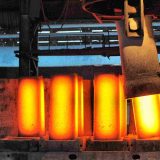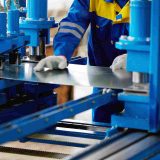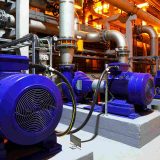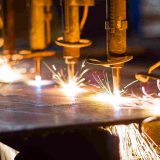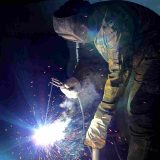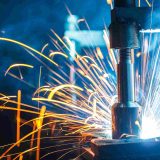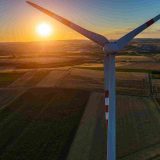FAQ
Frequently Asked Questions
- Can we tour the Michel Arthur Volel plant? How can we schedule a visit?
- Why was the plant named “Michel Arthur Volel“?
- Why was the plant erected in Cite Soleil?
- Who does E-Power supply electricity to?
- How can E-Power supply electricity at such a competitive rate using reciprocating engines?
- What does this project bring to the local communities and to the country?
- How long did it take to develop that project?
- Why isn’t E-Power using renewable energies instead?
- Why does E-Power employ foreign technicians?
- How many employees are working at E-power?
- What is the total capacity of the plant?
- What are the additional requirements in using heavy fuel oil?
- What are you doing about climate change?
- Why is it strictly prohibited to smoke on site?
- What measures are being taken to ensure the public’s safety?
- What is being done to ensure the health and safety of our employees?
E-Power happily opens its doors to groups of 7 or more who want to visit the plant and learn more about who we are and what we do. E-Power especially welcomes schools and is always pleased to conduct plant tours. Please contact the Community Relations office in advance via e-mail or telephone to schedule your visit. We look forward to offering you a tour of our facilities.
Email: groupvisits@epowerhaiti.com
Tel: +509 2813-0015
Michel Arthur Volel was a Priest of the Salesien’s Congregation, an emblematic figure of the Haitian Catholic Church who devoted all his life to serving the less fortunate, especially in the town of Cite Soleil.
He was concerned with the protection and respect of basic human rights in Cite Soleil and was a great advocate for the inclusion of the residents of the area in the Haitian society. He actively promoted the integration of the people of Cite Soleil in the Haitian labor force and encouraged their education and formation, building schools for children and vocational schools for adults.
We chose to locate our first power plant in Cite Soleil and to name it after Michel Arthur Volel as a public recognition of his great efforts and as a call to action, a collective commitment to pursue his dream and work towards the inclusion of the residents of Cite Soleil in the Haitian society.
Establishing our company in a community often regarded as one of the poorest, roughest, and most dangerous areas of the Caribbean’s, was a call to action, a collective commitment to work towards the inclusion of the residents of Cite Soleil in the Haitian society. It was a way to claim Cite Soleil back from the violent gangs that transformed it into a no-go zone, forge a new image of the area and send a clear message to other property owners and investors, encouraging them to come, establish their businesses in the area and take advantage of the free zone park already established there.
Our choice to locate our first Power plant in Cite Soleil was driven by our strong belief that the best way to fight crime and violence in Cite Soleil was through a proper integration of this community to the rest of the neighboring communities. We were and are still confident that building modern infrastructures that will allow the country to compete with neighboring countries -exactly where poverty and exclusion reach their climax- will create thousands of jobs and wealth and will help improve the competitive positioning of the area.
In Haiti, the State-owned utility EDH holds the monopoly for electricity transmission and distribution but also relies on the private sector for power generation. These Independent Power Producers (IPPs) help in improving the availability of energy to the country. According to the Haitian regulations and the take-or-pay 15-year Power Purchase Agreement (PPA) that was signed with the Haitian government, E-Power produces and sells its capacity exclusively to EDH and has no authority to sell, transmit or distribute electricity to other customers.
E-Power’s Michel Arthur Volel power plant uses diesel engines running on heavy fuel oil (HFO) with higher calorific values and operates on very strict procedures while respecting a rigorous maintenance plan to maintain efficiency at its highest. Since its commissioning E-Power has been the cheapest per kWh thermal power plant in Haïti.
In addition, E-Power’s state-of-the-art power plant was built according to the highest international standards in the electrical industry and in compliance with the United States Environmental Protection Agency (US EPA) regulations effective at the time of the PPA agreement. Every year, an internationally accredited company (Environmental Source Samplers) tests E-Power’s emission and environmental impact and the results are checked for compliance.
The Electric Plant Michel Arthur Volel is the most modern electric power plant that was ever built in Haiti. Designed by the Korean company, Hyundai Heavy Industries, one of the leaders in the manufacturing of electrical plants and assembled by DECCO International, the plant has eight (8) engines, a total capacity of 31.2 MW and supplies 30 MW of electricity to the electrical grid of EDH. These 30 MW have boosted the energy capacity in Port-au-Prince and are crucial in restoring the country’s electricity supply and access to electricity.
The long-term impact of this investment on economy is expected to be very positive, especially on the small and medium-sized enterprises where access to energy will create jobs that will improve the quality of life of the Haitian people and boost economic development.
It took nearly seven years to develop and implement that project. The promoter came with the idea in 2004 and in March 2005, 56 Haitian and Haitian-American citizens founded E-Power S.A. In 2006 the company won the international request for proposal to build a 30-MW electrical plant. The 15-year take-or-pay Power Purchase Agreement was signed between the Haitian State and E-Power in 2008. The turnkey power plant purchased from Hyundai Heavy Industries arrived in Haïti right after the devastating earthquake of January 2010 and after numerous unloading complications the first truck arrived at the plant on 3 March 2010. The plant was inaugurated on 13 January 2011.
E-Power was designed to respond to the request for proposal initiated by EDH and to respect the power purchase agreement with the goal to provide 30-MW at a minimum cost, without compromising safety and the environment. While renewable energy is very attractive its implementation is costly and it requires a longer amortization period. Renewable energy is usually implemented in a saturated grid along side a thermal or conventional energy to reduce the per-kilowatt-hour cost of said energy. Thermal energy remains the cheapest per kilowatt-hour capital investment.
Because of the limited number of skilled and experienced power plant workers in Haïti and the commitment to operate and maintain the power plant at the highest standards, E-Power contracted experienced international power plant technicians with 10 to 35-plus years of experience to operate, maintain and train the local employees. All the foreign technicians were contracted as trainers and to provide practical on-site mentorship to their local counterpart. E-Power is committed to providing its local staff with the right tools and the appropriate work environment to foster their full professional development and build up their expertise so that in the long run, a team of competent and motivated local personnel operates the Michel Arthur Volel’s power plant.
There are a total of 136 employees working for E-Power and they are spread over five departments: Finance and Administration, General Services, Operations, Maintenance and Safety-Health-Environment-Security-Community Relations-&-Fleet. For each department, every position was carefully designed and each employee was carefully chosen so everyone is important and contributes one way or another to the well functioning of the company.
The Michel Arthur Volel power plant comprises of 8 Hyundai Heavy Industries 9H3240 engines with an HIMSEN generator with a nominal capacity of 4.088 MW, delivering 3.9 MW. Of the total 31.2 MW generated, 1.2 MW is used internally for the functioning of the plant and all its auxiliaries. All the available remaining energy is delivered to the EDH grid.
Besides being more cost effective, burning heavy fuel oil allows E-Power to run the engines at 100% with the highest efficiency obtained when the load is between 90 and 100%. However Heavy Fuel Oil is a viscous residual fuel oil that contains relatively high amounts of pollutants and has to be properly conditioned before usage. Starting with a residual fuel oil respecting the requirements imposed by E-Power, the fuel is transferred to settlings tanks then cleaned by centrifugal separators before being conditioned by booster units for complete water removal and viscosity control and injection in the Hyundai engines.
We all have a role to play in managing climate change, and we, at E-Power, intend to do our part in limiting our environmental footprints, greenhouse gas emissions and in protecting the environment.
E-Power’s Power Plant is a HFO Diesel Facility where highly flammable materials, chemicals and components are manipulated. The availability of flames or ignition sources in hydro carburant Power Plants constitutes a great risk for the facility, the employees on site and the neighboring population. Risk minimization safety standards in HFO Diesel facilities require that smoking, open flames or any other ignition sources be prohibited in storage, handling and servicing areas where HFO is used. Fires from hydro carburant are very difficult and nearly impossible to extinguish and highly dangerous.
Safeguarding the public and the communities in which we live and operate is a critical priority for our business. So we take pride in ensuring that we are always prepared. Emergency Response Plans (ERPs) are vital tools designed to guarantee the safety of the communities we work in. We address public and facility protection, and ensure that all emergency responders always have a clear plan of action.
We constantly reevaluate our resources and expertise, keeping our safety standards and practices at par with those of the best and most reputable World-Class Independent Power Producers to ensure we respond quickly to any spills. In the event of an emergency, you can rest assured that we have your health and safety needs on top of mind.
We understand that people have concerns and questions about our business. We want to hear about your concerns and talk openly and honestly about the issues so that we can address them where needed and provide more information when necessary.
We provide basic safety training so everyone understands common risks and how to reduce them. We ensure that individuals have the experience and training to carry out their work and run programs that provide practical, onsite mentorship from more experienced staff to new employees. We also try to ensure our people are ready for the job everyday by helping them manage their fatigue and emphasing on the importance of being fully equipped to enter the plant. And we randomly conduct alcohol or drugs searches on site to ensure that workers are not impaired on the job.
Our Safety, Health, Environment, Security, Community Relations and Fleet department regularly implements safety programs and meetings to discuss safety issues, raise employee awareness about safety and emergency preparedness. The department also issues regular safety alerts to the executive managers and CEO to develop industry-recommended safety practices and procedures. They provide trainings that guide our workers toward a better and safer workplace.
Popular Requests
Send a CV
Want to visit us?

Like what you see?
Follow us on Social Media!


